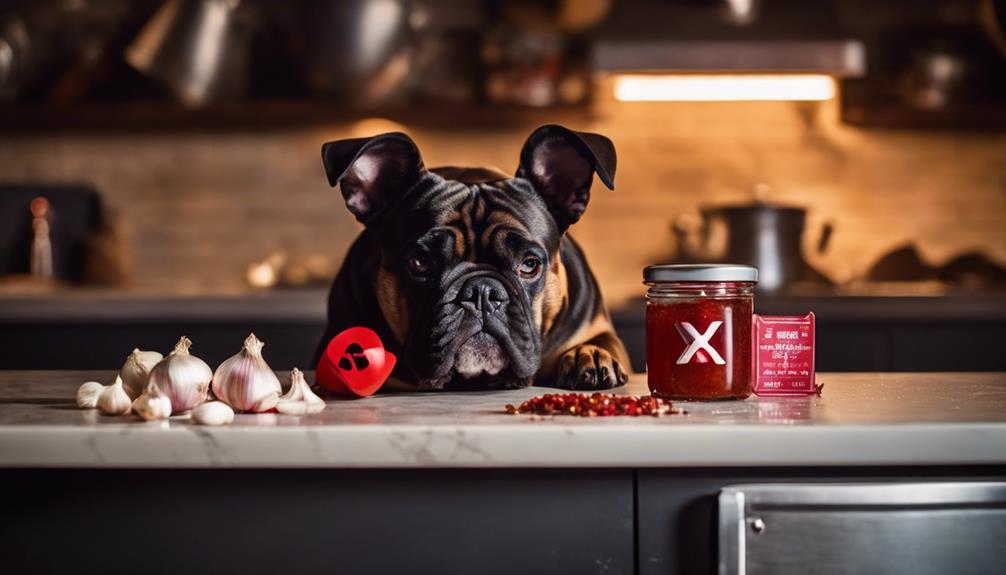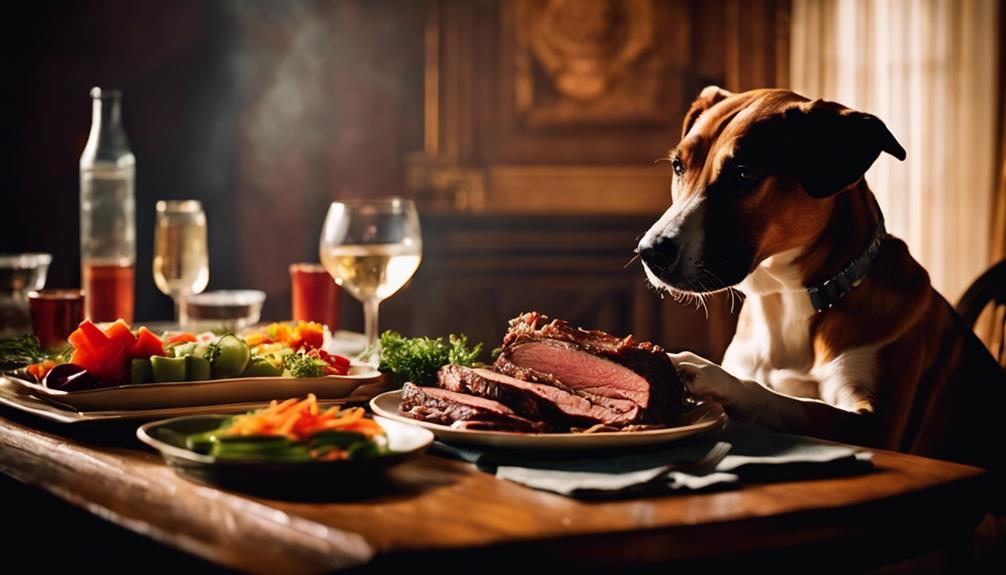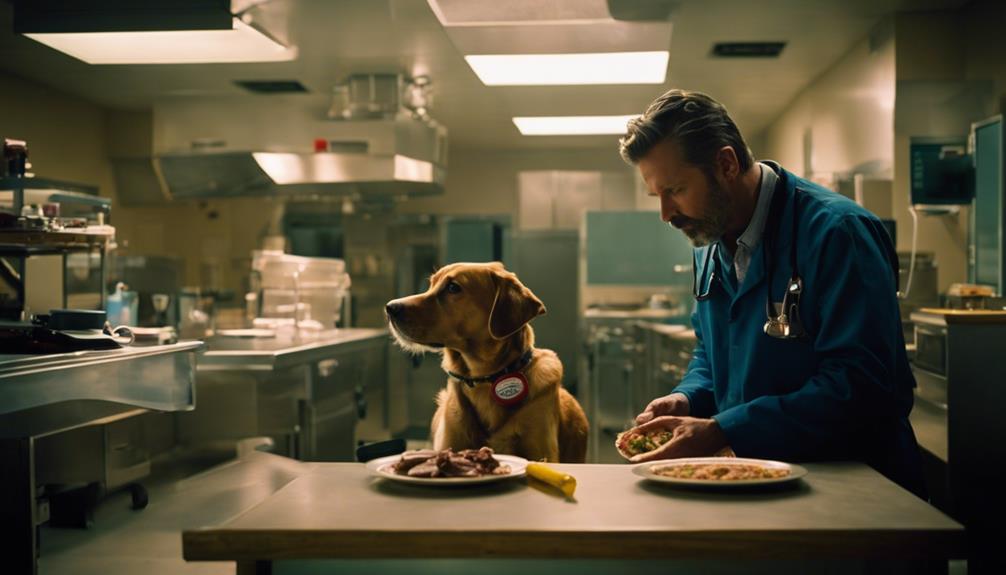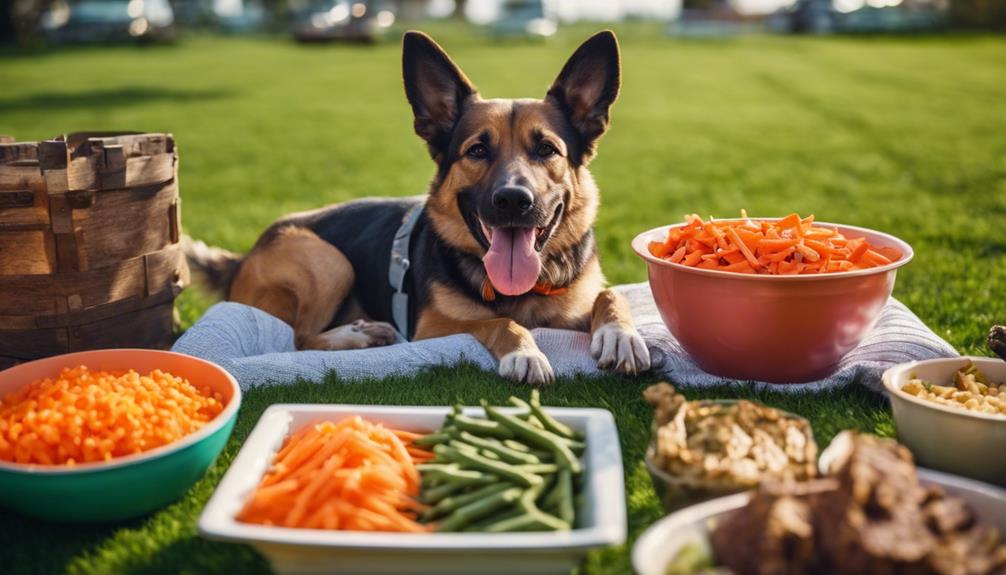Dogs and Brisket: Safety Tips
Dogs can enjoy plain brisket in small amounts because it’s a good source of lean protein. However, the common seasonings used on brisket, like garlic and onion, are dangerous for dogs. These can lead to anemia and problems due to too much salt.
Also, the fat in brisket can cause health issues like obesity and pancreatitis if dogs overeat it. It’s best to give dogs brisket with no extra fat and only to make it a small part of their diet. Talking to a vet before adding brisket to your dog’s meals is a smart move to keep them healthy.
This advice will help you find other foods that are better for your dog’s health.
Key Takeaways
- Plain brisket is okay for dogs, but only sometimes.
- Trim the fat; it’s better for their health.
- Say no to seasoned brisket; it’s not safe.
Understanding Brisket
Brisket comes from the lower chest area of a cow and includes both muscle and tough tissues. This makes it a flavorful and unique option for many recipes.
However, when thinking about feeding brisket to dogs, it’s essential to be cautious. Dogs should only have brisket in moderation and without spices to prevent health issues. This type of meat offers a good source of lean protein for dogs, which can benefit their diet.
Still, because brisket also has a lot of fat, talking to a vet before adding it to your dog’s meals is smart. This ensures your dog stays healthy and keeps their diet balanced.
Risks of Seasoned Brisket

Many dog owners might not know, but seasoned brisket can harm their pets. This is because it often contains garlic, onion, and lots of salt, which are dangerous to dogs. These ingredients can cause serious health problems such as anemia and sodium ion poisoning.
The high-fat content in seasoned brisket can also lead to obesity and pancreatitis in dogs. These conditions can significantly harm a dog’s health and happiness. That’s why it’s essential to keep seasoned brisket away from dogs. Owners should ensure it’s out of their pet’s reach to protect their health.
Safe Brisket Feeding Practices

To ensure your dog’s wellbeing, it’s safe to treat them to plain brisket occasionally. This meat is rich in protein but contains a lot of fat, so preparing and serving it carefully is essential. Here’s how you can include brisket in your dog’s diet without causing health issues like digestive problems or obesity.
Before cooking, trim off any extra fat from the brisket. This step helps prevent stomach upset in your dog. It’s also crucial to never give your dog brisket bones, as they can be a choking risk. Keep brisket treats to a small portion of your dog’s overall diet, ideally less than 10%, to avoid weight gain. Given the brisket’s high-fat content, talk to your vet about the correct serving size for your pet.
Serving your dog brisket safely involves simple steps. Following these tips, you can enjoy giving your dog this treat without worrying about their health.
Emergency Actions Post-Ingestion

If your dog eats brisket, watch them closely for signs of an upset stomach for the first few hours. Keeping an eye on your pet is critical to spotting any signs of trouble early on.
| Timeframe Post-Ingestion | Symptoms to Watch For |
|---|---|
| 6-8 Hours | Upset stomach |
| 12-24 Hours | Possible diarrhea |
| 24+ Hours | Ongoing or worsening symptoms |
If you notice your dog showing signs of distress, diarrhea, or ongoing discomfort, acting quickly is essential. Contact your vet right away. While most stomach issues from eating brisket clear up within a day, your vet’s advice is vital if your dog’s condition doesn’t improve or gets worse to ensure your pet stays healthy after eating something they shouldn’t have.
Alternatives to Brisket for Dogs

Feeding dogs brisket might not always be the best choice due to its high-fat content. Pet owners must look into healthier, safer options ensuring a well-rounded diet. Here are a few alternatives:
Lean cuts of beef, like sirloin or ground beef, are much better for dogs. They have less fat and are still full of the protein dogs need. Chicken and turkey breast are also excellent choices because they offer lean protein without the extra fat that comes with brisket. These meats can help keep your dog healthy and active.
Fish is another excellent option. Salmon or sardines, when cooked and deboned, are tasty and packed with omega-3 fatty acids. These nutrients are fantastic for your dog’s coat and skin health. Adding plant-based proteins and vegetables to your dog’s diet can also be beneficial. Items like lentils, chickpeas, and tofu, along with veggies like carrots, green beans, and sweet potatoes, introduce a variety of nutrients.
These alternatives not only provide essential nutrients but also make sure your dog’s diet is balanced without the risks that come with feeding them brisket. Remember, choosing the right food for your dog means focusing on their health and nutritional needs.
Frequently Asked Questions
Can Dogs Choke on Brisket Bones?
- Dogs risk choking on brisket bones.
- Brisket bones may cause dental injuries.
- Supervising dogs with bones is crucial.
Are Beef Brisket Bones Safe for Dogs?
- Beef brisket bones can splinter, harming dogs.
- Cooking increases risk; raw bones are safer.
- Supervision is vital during bone chewing.
What Is the Best Cut of Beef for Dogs?
- Lean beef cuts are ideal for dogs.
- Choose grass-fed, boneless beef.
- Cook without seasonings for safety.
Can Dogs Eat Cooked Beef?
- Dogs can eat lean beef cooked without spices.
- Keep servings small for their digestion.
- Avoid rich seasonings to reduce allergy risk.

